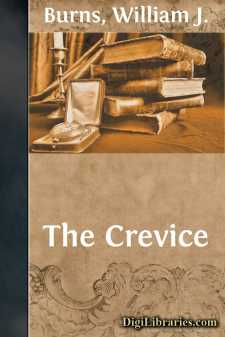Categories
- Antiques & Collectibles 13
- Architecture 36
- Art 48
- Bibles 22
- Biography & Autobiography 813
- Body, Mind & Spirit 142
- Business & Economics 28
- Children's Books 17
- Children's Fiction 14
- Computers 4
- Cooking 94
- Crafts & Hobbies 4
- Drama 346
- Education 46
- Family & Relationships 57
- Fiction 11829
- Games 19
- Gardening 17
- Health & Fitness 34
- History 1377
- House & Home 1
- Humor 147
- Juvenile Fiction 1873
- Juvenile Nonfiction 202
- Language Arts & Disciplines 88
- Law 16
- Literary Collections 686
- Literary Criticism 179
- Mathematics 13
- Medical 41
- Music 40
- Nature 179
- Non-Classifiable 1768
- Performing Arts 7
- Periodicals 1453
- Philosophy 64
- Photography 2
- Poetry 896
- Political Science 203
- Psychology 42
- Reference 154
- Religion 513
- Science 126
- Self-Help 84
- Social Science 81
- Sports & Recreation 34
- Study Aids 3
- Technology & Engineering 59
- Transportation 23
- Travel 463
- True Crime 29
The Crevice
by: William J. Burns
Categories:
Description:
Excerpt
CHAPTER I
PENNINGTON LAWTON AND THE GRIM REAPER
Had New Illington been part of an empire instead of one of the most important cities in the greatest republic in the world, the cry “The King is dead! Long live the King!” might well have resounded through its streets on that bleak November morning when Pennington Lawton was found dead, seated quietly in his arm-chair by the hearth in the library, where so many vast deals of national import had been first conceived, and the details arranged which had carried them on and on to brilliant consummation.
Lawton, the magnate, the supreme power in the financial world of the whole country, had been suddenly cut down in his prime.
The news of his passing traveled more quickly than the extras which rolled damp from the presses could convey it through the avenues and alleys of the city, whose wealthiest citizen he had been, and through the highways and byways of the country, which his marvelous mentality and finesse had so manifestly strengthened in its position as a world power.
At the banks and trust companies there were hurriedly-called directors’ meetings, where men sat about long mahogany tables, and talked constrainedly about the immediate future and the vast changes which the death of this great man would necessarily bring. In the political clubs, his passing was discussed with bated breath.
At the hospitals and charitable institutions which he had so generously helped to maintain, in the art clubs and museums, in the Cosmopolitan Opera House––in the founding of which he had been leading spirit and unfailingly thereafter, its most generous contributor––he was mourned with a sincerity no less deep because of its admixture of self-interest.
In aristocratic drawing-rooms, there were whispers over the tea-cups; the luck of Ramon Hamilton, the rising young lawyer, whose engagement to Anita Lawton, daughter and sole heiress of the dead financier, had just been announced, was remarked upon with the frankness of envy, left momentarily unguarded by the sudden shock.
For three days Pennington Lawton lay in simple, but veritable state. Telegrams poured in from the highest representatives of State, clergy and finance. Then, while the banks and charitable institutions momentarily closed their doors, and flags throughout the city were lowered in respect to the man who had gone, the funeral procession wound its solemn way from the aristocratic church of St. James, to the graveyard. The last extras were issued, detailing the service; the last obituaries printed, the final pæans of praise were sung, and the world went on its way.
During the two days thereafter, multitudinous affairs of more imperative public import were brought to light; a celebrated murder was committed; a notorious band of criminals was rounded up; a political boss toppled and fell from his self-made pedestal; a diplomatic scandal of far-reaching effect was unearthed, and in the press of passing events, the fact that Lawton had been eliminated from the scheme of things faded into comparative insignificance, from the point of view of the general public....


